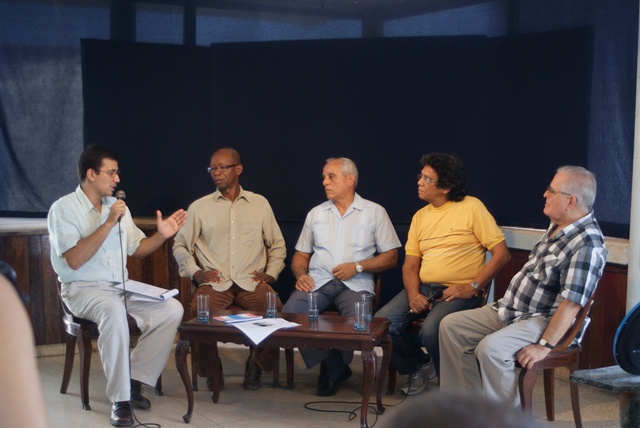
Antonio Rodiles continues to be held in the dungeons at Acosta and 10 de Octubre streets, for 9 days now. Perhaps the political police won’t free him before they trial they intend to hold, to avoid the bruises from the beating they gave him becoming public.
Socialist legality is a set of traps to bring down anyone who does not follow the path of the regime. A peaceful protest can be translated by a prosecutor into “disorderly conduct.” Similarly, if a man does not passively allow three State Security officers to beat him — officers in plain clothes who never identified themselves as authority before the blows began to fall — “revolutionary law” translates an action of legitimate self-defense by the victim into “resisting arrest.”
But it was not an arrest which State Security (DSE) agents carried out against Rodiles and a dozen people waiting outside State Security’s Department 21 — after having exhausted other avenues such as calling 106, the police information number — for the authorities to give them information on the whereabouts of Yaremis Flores, who was arrested with similar arbitrariness that same day.
It was an attack and not an arrest that the DSE agents carried out.
They did not communicate to Rodiles who they were, nor that they were going to arrest him. No police officer with a badge and arrest warrant showed up. Simply three men in plain clothes without the mediation of words attacking Rodiles who, according to Revolutionary law, “shouldn’t resist.”
There are too many cases of opponents of the regime who are driven to jail through some legal trap: Darsi Ferrer, Jorge Vázquez Chaviano are just a couple, there are many more.
Rodiles is the leader of Estado de Sats. As Ailer Gonzalez, his partner, explained to me once, the space took the name Estado de Sats from the Anthropology of the Theater, by Eugenio Barba (Odin Theatre). Estado de Sats is the movement of negation that leads to action: to cast the first stone you have to pull back your arm. The action takes place in an organic way. In a country uprooted from its vital centers, to talk and exchange ideas, images — art and thought — is an alternative that the powers-that-be recognize as “dangerous.”
Since last August, just after the arrest of Rodiles during the funeral of the leader of the Christian Liberation Movement Oswaldo Paya, the repressive organs of State Security have tried to block the realization of Estado de Sats in multiple ways. From a siege around the site to block the audience from attending, to the arbitrary arrest of Professor Dimas Castellanos and of the poet and photographer Orlando Luis Pardo Lazo.
Rodiles himself went, at the time of those arrests, to State Security’s Section 21 to demand the release of those arrested. In the words of a member the Cuban Patriotic Union (UNPACU) who was arrested by this same Department 21 of State Security, the agents told him “Even if Rodiles turned out to be the second coming of Padre de las Casas*, he was going to jail.”
This is how they intend to do it: through traps and sheltered by a “legality” that always protects the State and never the rights of the citizens.
On Wednesday, November 7, when they arrested Rodiles a wave of mass arrests of opponents took place in Havana, with virtually no communication because they cut off the phones of many of the detainees and their families and friends.
Rodiles’ father appeared before the police in a T-shirt bearing a decal for the liberation of his son and this caused a scandal for the authorities.
Faced with the pain of others, we must remember that if we do not share the responsibility of preventing the purposes of those who are creating the human rights crisis in Cuba, the deceptions of these regimes could continue to thrive in the heyday of dictatorships.
There is no State, no Church, no institution, no ideological, political or religious excuse to violate human rights. The extreme left-wing communist States have found a systematic way, protected by their Constitutions, to carry out these violations of human rights which are their only guarantee for perpetuating their own political power.
*Translator’s note: Padre de las Cases was an early hero of Cuban history.
November 16 2012
